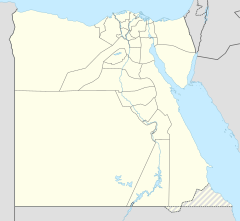| Abdeen Palace | |
|---|---|
 The main facade of the Palace. The main facade of the Palace. | |
 | |
| General information | |
| Town or city | Abdin Square Cairo |
| Country | |
| Coordinates | 30°02′30″N 31°14′54″E / 30.04167°N 31.24833°E / 30.04167; 31.24833 |
| Construction started | 1863 |
| Cost | £E2,700,000 |
| Technical details | |
| Size | 44 feddans |
| Design and construction | |
| Architect(s) | French architect Rousseau |
Abdeen District is the home of Abdeen Palace (Arabic: قصر عابدين), a 19th-century Cairo palace built by Khedive Ismail and served as the Egyptian royal household's primary official residence from 1874 until the July Revolution in 1952. Since then it has been of the presidential palaces. The palace is centered in its eponymous district, administratively part of the Western Area of Cairo, and part of the Khedival Cairo Area of Value to the west of Historic Cairo.
Overview
Built on the site of a small mansion owned by Abdeen Bey, Abdeen Palace, which is named after him, has adornments, paintings, and a large number of clocks scattered in the parlors and wings, most of which are decorated with pure gold. Built under the rule of Ismail Pasha, to become Egypt's official government headquarters instead of the Citadel of Cairo (which had been the center of Egyptian government since the Middle Ages), this palace was used as well for official events and ceremonies.
The construction started in 1863 and continued for 10 years and the palace was officially inaugurated in 1874. Erected on an area of 24 feddans, the palace was designed by the French architect Léon Rousseau along with a large number of Egyptian, Italian, French and European decorators. A new wing was added by Joseph Urban in 1891. However, the palace's garden was added in 1921 by Sultan Fuad I on an area of 20 feddans. The cost of building the palace reached £E700,000 in addition to £E2 million for its furnishing. Between four palaces, King Fuad spent more than 18 million French francs with just one Parisian furniture manufacturer Linke & Cie. More money was also spent on the palace's alteration, preservation and maintenance by consecutive rulers. The palace has 500 rooms.
Museum
The palace today is a museum, located in the Old Cairo district of Abdeen. The upper floors (the former living quarters of the royal family) are reserved for visiting foreign dignitaries. The lower floors contain the Silver Museum, the Arms Museum, the Royal Family Museum, and the Presidential Gifts Museum. A new museum, the Historical Documents Museum, was opened in January 2005. Among other documents, it contains the Imperial Ottoman firman, or decree, which established the rule of Muhammad Ali and his family, and a certificate for the Order of the Iron Crown, from the short-lived South American Kingdom of Araucanía and Patagonia.
See also
References
- ^ "Abdeen Palace Museum". Sis.gov.eg. 2022-06-11. Retrieved 2023-03-23.
- "Western Area". www.cairo.gov.eg. Retrieved 2023-02-23.
- Khedival Cairo protection boundaries (PDF) (in Arabic). Cairo: National Organistation for Urban Harmony. 2022.
- ^ "Abdeen museums to open soon. - Free Online Library".
- "Interview with Mohamed Mokhtar, curator at the Abdeen Palace Museum, Cairo, Egypt". 11 January 2021.
- Christopher Payne, 'François Linke 1855-1946, The Belle Époque of French Furniture', Antique Collector's Club 2003, p.269
- ^ "Cairo Museums details". Cairo Governorate Portal. March 23, 2022. Retrieved March 23, 2022.
External links
Categories:- Museums in Cairo
- Palaces in Cairo
- Art museums and galleries in Egypt
- History museums in Egypt
- Presidential palaces in Egypt
- Royal residences in Egypt
- Muhammad Ali dynasty
- Tourist attractions in Cairo
- Tourist attractions in Egypt
- Houses completed in 1874
- Neoclassical architecture in Egypt
- Downtown Cairo
- 1874 establishments in Egypt
- 19th-century architecture in Egypt